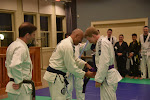I'd like to keep a running list of my favourite technology-related books . these aren't 'manuals', they are books about some aspect of technology. the titles are numbered to roughly match how much I enjoyed the read.
for the book to make the "worth the time" list, I don't have to agree with the author. I simply have to respect the title in some way. for example, I'm not an advocate of objectivism, but I appreciate the writing style of Ayn Rand. of course, Rand isn't technical enough for this list - I'll have to think about writing a favourite fiction post.
well worth the time:
Code: The Hidden Language of Computer Hardware and Software by Charles Petzold
if your curious about the fundamental electronics that enable software, then this is a great book for you to read.
The Age of Spiritual Machines: When Computers Exceed Human Intelligence by Ray Kurzweil
I may not agree with kurzveil's neatly rose-coloured opinion of technology, but this is an interesting read. besides, the Canadian band our lady peace named one of their albums after this book.
you may be wondering what I mean by "rose-coloured". kurzveil talks about technology as if it is the great panacea. personally, I have trouble believing that technology such as designer cybernetic implants will be developed without notable negative consequences. look at what happened with silicon breast implants.
How Would You Move Mount Fuji? : Microsoft's Cult of the Puzzle -- How the World's Smartest Companies Select the Most Creative Thinkers by William Poundstone
this is a great read. it's an exploration of interview techniques that have become popular at software companies. if you're looking for a job, you should definitely read this title. also, it contains a number of cool logic puzzles.
Masters of Doom: How Two Guys Created an Empire and Transformed Pop Culture by David Kushner
this book is excellent; it features solid content presented within quality writing. essentially this title is a great example of what books such as Opening the Xbox attempt to accomplish.
Microserfs by Douglas Coupland
this one barely qualifies for the list since it really isn't about technology. however, it is written by a Canadian writer and it starts off with the protagonist working for Microsoft.
Cyberpunk: Outlaws and Hackers on the Computer Frontier by Katie Hafner
this book is interesting because it diffuses the romanticism that surrounds hackers. before I read Cyberpunk, I assumed that all the high profile hackers are gifted developers. this book presents evidence that time can be more important than skill.
I, Robot by Isaac Asimov
some people feel that Asimov's style doesn't meet a high enough bar for him to be known as a great writer. I'm not much concerned with that reputation. I liked this book and I will read more Asimov in the future. it's true that I, Robot doesn't offer anything as intricate as the Byzantine tapestry of Dune. I suspect that I would have appreciated the book even more at a younger age.
however, the ideas within I, Robot are far ahead of their time - if you search the net, you'll find that robot psychology is only just emerging as a respected field of research. BTW - since the recent movie is only loosely based on the ideas of the book, it's a big stretch for the publisher to release an edition of this book with Will Smith on the cover.
if you're a modding fan, pick up a copy of The Black Art of Xbox Mods by Jonathan S. Harbour. this is an example of the quality work that they're doing at SAMS.
Barbarians led by Bill Gates by Jennifer Edstrom, Marlin Eller
if you want to read a book written by a bitter ex-microsoftie, then check this one out.
The Innovator's Dilemma by Clayton M. Christensen
this one comes with a qualifier: although it's not really worth reading the whole book, the concepts are important enough that I put it in the positive category. In other words, the book is an important work, but it was written in the style of a business report. the supporting evidence is dry so don't feel that you have to trudge through all of it.
on the fence:
The End of Work: The Decline of the Global Labor Force and the Dawn of the Post-Market Era by Jeremy Rifkin
Saturday, February 19, 2005
Subscribe to:
Post Comments (Atom)



2 comments:
A great read is "The Psychology of Everyday Things" (aka known as TPOET). It talks about good and bad industrial design. I think it goes under the name "The Design of Everyday Things" nowadays.
yes, I have this one of my 'to read' shelf - which I have to admit, is overflowing.
thanks for the comment.
Post a Comment